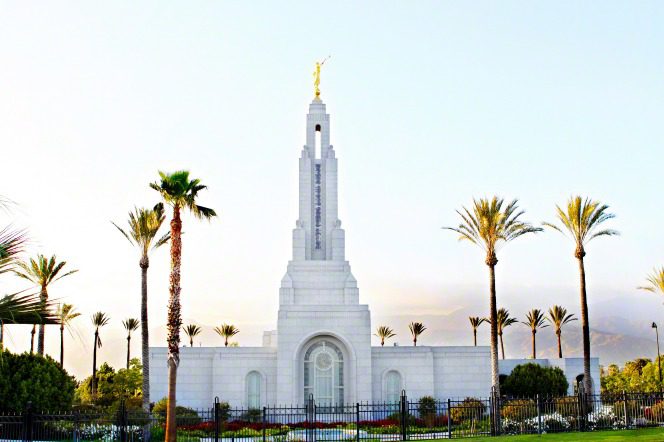
(LDS Media Library)
But first: It’s my practice, when I’m running on all cylinders, to do at least a little bit of reading in the Greek New Testament every day. Here’s an observation on Acts 1:15-26:
15 ¶ And in those days Peter stood up in the midst of the disciples, and said, (the number of names together were about an hundred and twenty,)
16 Men and brethren, this scripture must needs have been fulfilled, which the Holy Ghost by the mouth of David spake before concerning Judas, which was guide to them that took Jesus.
17 For he was numbered with us, and had obtained part of this ministry.
18 Now this man purchased a field with the reward of iniquity; and falling headlong, he burst asunder in the midst, and all his bowels gushed out.
19 And it was known unto all the dwellers at Jerusalem; insomuch as that field is called in their proper tongue, Aceldama, that is to say, The field of blood.
20 For it is written in the book of Psalms, Let his habitation be desolate, and let no man dwell therein: and his bishoprick let another take.
21 Wherefore of these men which have companied with us all the time that the Lord Jesus went in and out among us,
22 Beginning from the baptism of John, unto that same day that he was taken up from us, must one be ordained to be a witness with us of his resurrection.
23 And they appointed two, Joseph called Barsabas, who was surnamed Justus, and Matthias.
24 And they prayed, and said, Thou, Lord, which knowest the hearts of all men, shew whether of these two thou hast chosen,
25 That he may take part of this ministry and apostleship, from which Judas by transgression fell, that he might go to his own place.
26 And they gave forth their lots; and the lot fell upon Matthias; and he was numbered with the eleven apostles.
I don’t know that any Latter-day Saint reader has ever actually been confused by the phrase in Acts 1:20, “his bishoprick let another take.” But I can imagine such confusion. Wasn’t Judas an apostle? Why, then, is there a reference to his “bishopric”?
The Greek term that is translated here as bishopric is ἐπισκοπὴν. Our word bishop actually comes from this same Greek word family, and specifically from the term επίσκοπος or epískopos. (Just remove the initial e and take off the masculine nominal ending –os, and you’re left with -piscop-, which should make the resemblance pretty obvious.)
But the word epískopos (from epi-, “over,” or “upon,” and skopos, which conveys the idea of “looking,” as in telescope, microscope, and so forth) very literally means “overseer” (thinking Germanly) or, also very literally (but thinking Latinly), “superintendent.” And, while that fits the duties of a bishop quite well, the word seems pretty clearly in this case to have been used more broadly.
Browsing through other, more modern, English translations, you’ll find what the KJV translates as “his bishopric” rendered most commonly as “his position” or “his office.” You’ll also occasionally find such things as “his place of leadership,” “his job,” “his place of service,” “his position of responsibility,” “his overseership,” “his work,” and “his ministry.”
I would think that “his stewardship” wouldn’t be too far wrong. Maybe even, more loosely, “his calling.”
***
Interpreter: A Journal of Mormon Scripture published two reviews of the same book today:
***
The Interpreter Foundation has also published two new Old Testament KnoWhys for students and teachers in the Gospel Doctrine classes of the Church of Jesus Christ of Latter-day Saints:
“Why Is the Story of David and Bathsheba Significant? (Part 1 of 2)” An Old Testament KnoWhy[1] relating to the reading assignment for Gospel Doctrine Lesson 24: “Create in Me a Clean Heart” (2 Samuel 11-12; Psalm 51) (JBOTL24A)
“Why Is the Story of David and Bathsheba Significant? (Part 2 of 2)” An Old Testament KnoWhy[1] relating to the reading assignment for Gospel Doctrine Lesson 24: “Create in Me a Clean Heart” (2 Samuel 11-12; Psalm 51) (JBOTL24B)
***
You might enjoy these podcasts, too:
“Old Major,” with Alexander L. Baugh
“19th Century Restorationists,” with RoseAnn Benson
“The Millennial Temple,” with R. Jean Addams
***
Yes, you’re right. The Interpreter Foundation certainly provides you with a very great deal of good stuff, a steady stream of worthwhile listening and reading and viewing.
And, as you’ve noticed, you’re not being charged for all this!
I know what you’re thinking. So I want to be helpful:
“Donating to The Interpreter Foundation”
Posted from Newport Beach, California












